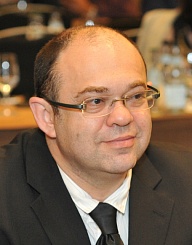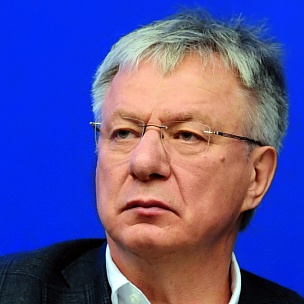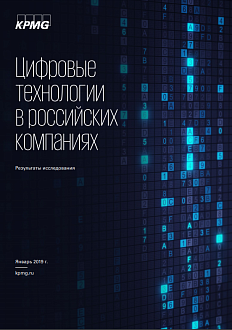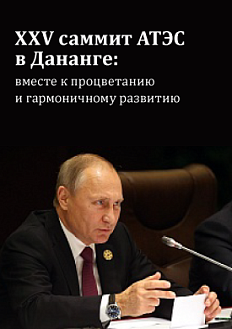ŌĆ£Business is a competition of management systemsŌĆØ

Management means making decisions in the atmosphere of uncertainty, stress and risk. How high is the degree of those factors in Russia?
Managers no longer experience stress these days. People are used to circumstances, and they found ways to exist in the new post-crisis, high-risk world. However, the growth rates that were there in the 1990s and 2000s, are not seen anymore. After the collapse of the Soviet Union, any kind of business initiative exploded, no matter if the one who launched it made little effort or had little competence. The market was vacant back then; today it is crowded with players and, as a result, with supply.
The winners in the current situation are, firstly, those who are positioned at a higher professional level than others, and secondly, those who were able to build an efficient management system. That implies strategic directions for the company’s development clearly laid out by the top management; sound organizational structure that supports achievement of strategic goals; properly distributed authority; efficient system of information and system of staff motivation.
However, that is where problems arise. While a large business has the opportunity to adopt the Western experience through employment of professionals, the owners of medium-sized companies do not always have the financial capacity or simply do not see the point to do so. And that is wrong! Evidently there is lack of basic managerial skills among business owners, and lack of sufficient competence among staff in general.
Managers lack knowledge in finance, HR, understanding the market, building efficient business processes. In addition, employees need not only to be discovered, but also to be trained. And who could do that, if the managers themselves are not always sure how to achieve top performance?
Again, I’m not talking about the lack of competence in general. I’m talking about professional business education, when you know exactly how to multiply profits, efficiency, return rate, and so on. Russian entrepreneurs often navigate on intuition rather than science, in the broadest sense of the word. At the same time, now there is awareness of the need for professional rather than artisanal approach.
How is that reflected in business?
Businesses become more professional due to increasing competition. Like I said before, management systems are in competition now. That is why company leaders have to respond to the challenges of the market, they have to maneuver rapidly, to be flexible and efficient.
Management was different twenty years ago. Back then it appeared to the management that they knew everything. Today they understand that their knowledge is not enough, so they get an MBA degree, they resort to help from the outside, they see how professionalism relates to financial performance. For example, many have already realized that it is not always efficient to hire trained professionals. It is better to raise them. And in general, the psychology of business owners has changed: Russian business has become more systemic.
The problem of the Russian businesses that you mentioned lies in authoritarian governance, which pushes free-thinking, open-minded managers aside. But the problem is also that ordinary employees are used to dictatorial management, and they no longer have respect for egalitarian managers. How can this situation be changed?
Authoritarianism is not always a negative thing. It has positive influence when the company finds itself at the initial stage of development. As a rule, in a small operation everything depends on one person, and it makes no sense to hand out responsibility to others: the risks, the authority, the money. There is no system in such operation yet, there is no well-adjusted mechanism.
However, other mechanisms work in a mid-sized or a large company. The cost of error, the risks, the responsibilities, the tasks grow together with the scope of the operation. One person does not cope with such volume, because the day is only 24 hours, and there is simply no way one can be competent in all areas. Delegation of authority is required then. That is where problems arise: the founder often does not want, does not know or does not understand how it is done properly. And that is when people lose initiative and energy. Nine out of ten cases, it is not about people, but rather about the organizational model and the environment.
If an employee does not have the authority or resources to achieve the goal, they do not want to bear responsibility for the result. If they do not understand the goal, and there is no opportunity to take part in decision-making, they will not be proactive. On top of that, there is inadequate evaluation of work and compensation. As a result, employees become passive, they turn into yes-men who simply do what they are told.
Once all of that is adjusted, in three or four months we see how people’s attitude to work changes. The right balance of control and freedom, distinct boundaries of authority and responsibility, as well as motivation attached to them—all of those things provide excellent results. So there are three questions that the employee must answer: Do I know what to do? Can I do that? Do I want to do that?
In one of the interviews, Ichak Adizes said that a manager used to have a big mouth and small ears, but now it should be the other way around. That is, a manager must learn to give less orders and to pay more attention to the information coming from his team. Do the Russian managers have their «ears grown»?
The ears have grown, but there is still room to grow (smiling). It is still the matter of mutual trust and respect, creation of management structure, delegation of authority.
With the development of technology, people start working from out of their offices. In Russia it is happening too, albeit slowly. How prepared are the Russian managers to lead the personnel remotely?
I think they have no other way to go, because that is inevitable. While that has not become a common thing yet, the trend gains momentum, especially in the IT business. Because this work format is more economical and ergonomic for the business owner, yet the company obtains a good specialist. But that is where it is important to set the tasks, to have a distinct KPI system and control points for evaluating the result.
People are now less willing to work than before. It is often more important for them to fulfil their own potential, their abilities, to do exactly what they want in life. Money is not much of a motivation anymore. What generally motivates people now?
Young people born in the 1990s and the 2000s received good education. Those people are not too challenged financially, they have access to the entire world, but they are not ready to work hard. They do not have long-term plans, they lead a healthy lifestyle, and it is important for them to have time for their hobbies, themselves and their families.
What can I say? Conditions need to be created for them: exciting tasks, opportunities, prospects, a good team. They need a mission that would coincide with their attitude.
Adizes once said that love is the highest form of integration in business. Do you agree with this definition?
The theme of the Adizes method is the principle of mutual trust and respect. From our perspective, respect is recognition of another person’s right to think differently from the way you think, to be themselves. It is the independence of human and professional relations. Trust is understanding and acceptance of long-term common interests.
Everyone should realize that if they forsake their interests now, assenting to a colleague, the colleague would do the same for them in the future. However, the goal would be the same, it would be shared. In the broadest sense, all that is love.
If that does not happen, people do not hear each other and do not listen to each other. All of the energy is wasted on resolving internal conflicts, so there is simply no strength left to deal with external threats and problems.
Anlytics on the topic

Deloitte’s report provides the results of an analysis of human and brand behavior during the COVID-19 pandemic, explaining the prosperity of individual companies during these challenging times. The authors of the report look at current methods of maintaining consumer brand loyalty in a rapidly changing world, highlighting seven key trends.

One of the key themes of EEF 2018 is the digital economy. Alexander Galitsky, founder of venture fund Almaz Capital and one of the bestknown entrepreneurs in the Russian IT industry, discusses whether it has become more difficult for Russian companies to break into the international market, the culture of buying innovation in Russia, and why blockchain is the future.

The aims of the study by KPMG are to assess the current level of digitalization in large Russian companies, find out which technologies are tested and implemented the most commonly, and outline main approaches to managing digital transformation.

Article by Vladimir Putin, The 25th APEC Meeting in Danang: Together Towards Prosperity and Harmonious Development is the announcement of the position of the Russian side on the eve of the APEC anniversary summit, held on 10-11 November 2017.

